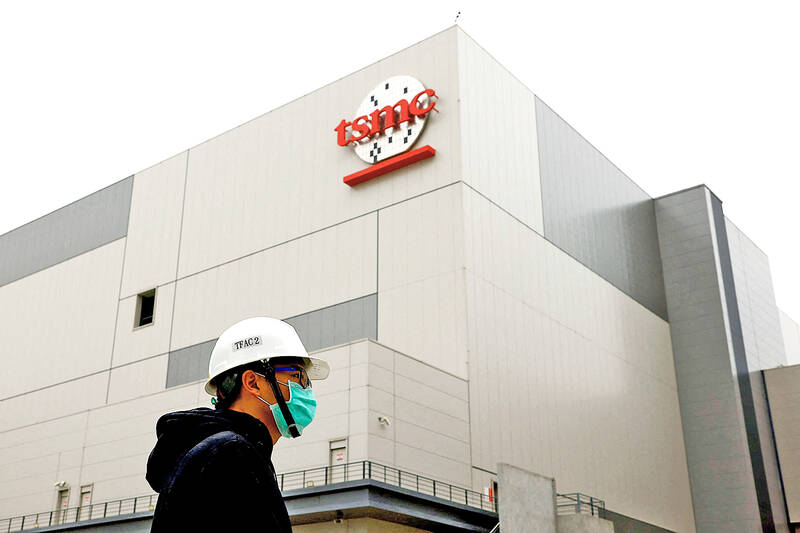Taiwan Semiconductor Manufacturing Co (TSMC, 台積電), the world’s largest contract maker of advanced chips, yesterday said it is a law-abiding company, and is committed to complying with all applicable laws and regulations including export controls.
The Hsinchu-based chip giant issued the statement after US news Web site The Information ran a story saying that the US Department of Commerce has launched a probe into TSMC over whether it breached export rules by making smartphone or artificial intelligence (AI) chips for China’s Huawei Technologies Co (華為).
“We maintain a robust and comprehensive export system for monitoring and ensuring compliance,” the statement said.

Photo: Ann Wang, Reuters
“If we have any reason to believe there are potential issues, we will take prompt action to ensure compliance, including conducting investigations and proactively communicating with relevant parties including customers and regulatory authorities as necessary,” it added.
US regulators had contacted TSMC to enquire over any production for Huawei, The Information said.
Huawei was blacklisted by the US in 2020 over national security concerns, barring it from securing chips made using US equipment. The restrictions also prevent Huawei from making its own chips using US technology without approval from the commerce department.
Huawei has said that all its advanced chips are sourced from Semiconductor Manufacturing International Corp (SMIC, 中芯國際), China’s biggest chipmaker.
The Chinese technology brand last year launched a smartphone with an advanced 7-nanometer chip made by SMIC, with the processor lauded by many in the industry as a major breakthrough for Chinese firms.
Beyond Huawei, the US had over the past two years introduced curbs banning Chinese companies from accessing the most advanced AI chips and technology. Firms such as Nvidia Corp and Advanced Micro Devices Inc, which make the most cutting-edge AI chips, cannot sell them to the Chinese market.
TSMC, the sole chip supplier of Apple Inc’s iPhone series, is also a key supplier of advanced chips used in AI applications.
TSMC chairman and chief executive C.C. Wei (魏哲家) told an earnings conference call on Thursday that AI demand is real and almost all major AI players are the company’s customers.
That explained why TSMC posted a record net income of NT$325.26 billion (US$10.14 billion) for the third quarter and forecast a sequential 13 percent increase in revenue for the fourth quarter.
Wei described the AI boom as just the beginning of a long-term trend that would enable TSMC to post healthy business growth over the next five years.
TSMC shares yesterday rose 4.83 percent to close at a new high of NT$1,085, Taiwan Stock Exchange’s data showed.

TARIFFS: The global ‘panic atmosphere remains strong,’ and foreign investors have continued to sell their holdings since the start of the year, the Ministry of Finance said The government yesterday authorized the activation of its NT$500 billion (US$15.15 billion) National Stabilization Fund (NSF) to prop up the local stock market after two days of sharp falls in reaction to US President Donald Trump’s new import tariffs. The Ministry of Finance said in a statement after the market close that the steering committee of the fund had been given the go-ahead to intervene in the market to bolster Taiwanese shares in a time of crisis. The fund has been authorized to use its assets “to carry out market stabilization tasks as appropriate to maintain the stability of Taiwan’s

STEEP DECLINE: Yesterday’s drop was the third-steepest in its history, the steepest being Monday’s drop in the wake of the tariff announcement on Wednesday last week Taiwanese stocks continued their heavy sell-off yesterday, as concerns over US tariffs and unwinding of leveraged bets weighed on the market. The benchmark TAIEX plunged 1,068.19 points, or 5.79 percent, to 17,391.76, notching the biggest drop among Asian peers as it hit a 15-month low. The decline came even after the government on late Tuesday authorized the NT$500 billion (US$15.2 billion) National Stabilization Fund (國安基金) to step in to buoy the market amid investors’ worries over tariffs imposed by US President Donald Trump. Yesterday’s decline was the third-steepest in its history, trailing only the declines of 2,065.87 points on Monday and

TARIFF CONCERNS: The chipmaker cited global uncertainty from US tariffs and a weakening economic outlook, but said its Singapore expansion remains on track Vanguard International Semiconductor Corp (世界先進), a foundry service provider specializing in producing power management and display driver chips, yesterday withdrew its full-year revenue projection of moderate growth for this year, as escalating US tariff tensions raised uncertainty and concern about a potential economic recession. The Hsinchu-based chipmaker in February said revenues this year would grow mildly from last year based on improving supply chain inventory levels and market demand. At the time, it also anticipated gradual quarter revenue growth. However, the US’ sweeping tariff policy has upended the industry’s supply chains and weakened economic prospects for the world economy, it said. “Now

An employment discrimination lawsuit against contract chipmaker Taiwan Semiconductor Manufacturing Co (TSMC, 台積電) might soon be expanded after a hearing in a federal court in San Jose, California, on Tuesday to add 15 plaintiffs to the case. According to a court document, the lawsuit, which was refiled in November last year as a form of a class action with 13 plaintiffs in California, wants to add 15 plaintiffs from Arizona, where TSMC is building up its wafer fab capacity. TSMC first committed between 2020 and last year to invest US$65 billion in three advanced wafer fabs in Arizona. It then pledged an